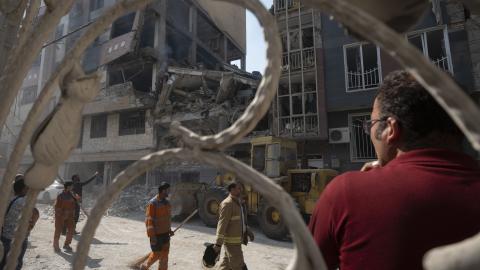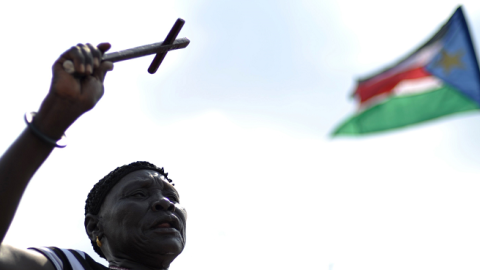With an indicted war criminal for a president, a decades-long record of conflict in the south that cost two million lives, and a continuing genocidal conflict in Darfur in the west, Sudan, it seems, could do nothing at this point that would shock. Yet, this week it did. Even against the backdrop of the news of 276 Nigerian schoolgirls abducted by Boko Haram, it managed to shock the world’s conscience once again, with the case of Meriam Yehya Ibrahim.
Ibrahim is a 27 year old Sudanese mother now eight-months pregnant with her second child, the wife of a naturalized American citizen from South Sudan, and a medical school graduate. She is also a condemned prisoner on death row in Khartoum.
On Thursday, the Sudanese Public Order Court affirmed that Ibrahim is to be sentenced to 100 lashes of the whip and then to death by hanging. Under Sudan’s application of sharia law, the former punishment is for adultery due to the fact that she is a Muslim woman married to a Christian man, a marriage considered invalid, and the latter, somewhat contradictorily, for having left Islam to become a Christian, which is a capital crime. Her husband, Daniel Wani, has not been charged with adultery.
Ibrahim attested that she was raised as a Christian by her single mother, an Ethiopian Orthodox Christian, and never practiced Islam. Witnesses on her behalf were barred from testifying because they were Christian, though she produced a marriage certificate identifying her as a Christian. Nevertheless, the judge determined that because her father was a Muslim, even though he abandoned the family when she was six, she too was a Muslim who left Islam. It gave her several days to recant her Christian faith but she refused, firmly telling the court,“I am a Christian and I will remain a Christian.”
The court postponed execution of the sentence, to give her time to recover from childbirth and to wean the new baby. Her lawyer, Mohamed Jar Elnabi, a Muslim, has received death threats for defending her but is planning to go forward with an appeal. Meanwhile, her one-and-a-half year old son, Martin, who is an American citizen, has been imprisoned with her. Both mother and child have been struggling with illnesses contracted in the deplorable conditions of Omdurman Federal Women’s Prison.
Today, Muslims who apostate to Christianity are not commonly executed, although they receive harsh treatment in several Muslim-majority countries. Iran, for example, has put converts to Christianity and Christian evangelizers on trial in recent years—including Iranian-American Pastor Saeed Abedini, now serving an eight year prison term for both offenses. Saudi Arabia has recently beheaded women for “sorcery” but has avoided apostasy trials involving its few Christian converts.
For the related sharia crime of blasphemy, Pakistan has doled out the death sentence to Christians—Asia Bibi, the mother of five, is one currently on death row— but asserts that none has ever been carried out by the state. Some years ago, Afghanistan found a citizen guilty of its capital crime of apostasy for having converted to Christianity, but released him on grounds of insanity after the case drew international protest. Apostates from Islam are not infrequently murdered or intimidated by extremists or fanatical family members but seldom do governments carry out death sentences for apostasy from Islam.
Christianity arrived in Sudan, about 125 miles northeast of Khartoum, with the eunuch minister of Queen Candice in 35 AD. But today, Sudan barely tolerates its small Christian communities. Since 1999, under the International Religious Freedom Act, the State Department has designated Sudan as a “Country of Particular Concern”—a short list of the world’s worst persecutors.
The independent US Commission on International Religious Freedom (USCIRF) found that the forcible imposition of sharia played a large role in Sudan’s north-south conflict, which ended with a peace agreement in 2005. It now reports that in Sudan “the government of President Omar al-Bashir imposes a restrictive interpretation of Shari’ah law on Muslims and non-Muslims alike, uses amputations and floggings for crimes and acts of ‘indecency’ and ‘immorality,’ and arrests, harasses, and discriminates against members of the small Christian community.”
No one is known to have been executed for apostasy in Sudan since 1991, when it was made a capital crime. But Bashir’s government is becoming ever more extreme. USCIRF has found that in the last two years “the number and severity of harsh Shari’ah-based judicial decisions has increased, including sentences of amputation for theft and sentences for stoning for adultery.” The government is now vowing to draft the new constitution as a sharia one, according to its own strict interpretation. At the beginning of this month, Sudanese Catholic Bishop Macram Gassis reported that Sudan’s air force deliberately bombed the world-acclaimed Mother of Mercy Hospital, the only hospital in the country’s Nuba Mountains, leaving several peope with shrapnel wounds. These are troubling signs of the government’s further Talibanization of Sudan.
This week the United States joined with Canada, the United Kingdom, and the Netherlands to express concern over the apostasy ruling against Ibrahim, and there was a good diplomatic presence at her hearing on Thursday. Such international pressure must be sustained if Ibrahim is to have a chance.

















